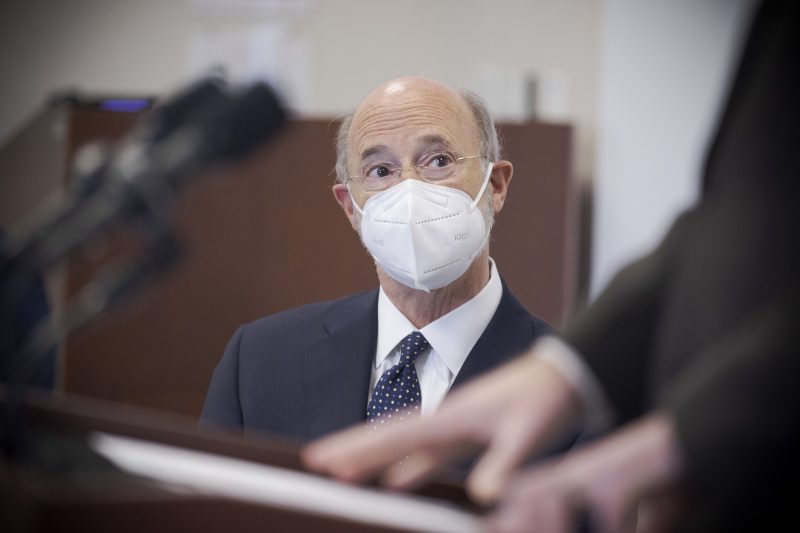The state Health Department is once again citing a decades-old law that it has used numerous times to prevent greater public scrutiny of its coronavirus pandemic response.
Ese Olumhense of Spotlight PA
Spotlight PA is an independent, nonpartisan newsroom powered by The Philadelphia Inquirer in partnership with PennLive/The Patriot-News, TribLIVE/Pittsburgh Tribune-Review, and WITF Public Media. Sign up for our free newsletters.
HARRISBURG — The Wolf administration is refusing to disclose details of wasted coronavirus vaccine doses, including how many have been discarded by each provider, citing a decades-old law that it has frequently used to shield the public from scrutinizing its pandemic response.
The state Department of Health recently denied a public records request by Spotlight PA seeking documentation of vaccine doses that providers did not administer because of expiration, damage, or other factors. The request did not seek any patient information.
Providers are required to self-report to state health officials whenever a dose of vaccine is “compromised,” and explain why. Those discarded for any reasons other than expiration or broken vials must also be accompanied by an incident report.
State health officials declined to provide any of those records in response to Spotlight PA’s request, citing the Disease Prevention and Control Law.
The 1955 law gives the state broad authority to keep information on contagious diseases confidential, such as details that could potentially identify individuals. But legal experts said it also gives the state discretion over what records to make public in the interest of transparency.
“What’s really important to note here is that the DPCL grants the Department of Health considerable discretion to release anything when it serves the public interest,” said Melissa Melewsky, media law counsel at Pennsylvania NewsMedia Association (of which Spotlight PA is a member). “They are choosing not to do that. And they have never justified that in the context of a Right-to-Know denial.”
Spotlight PA plans to appeal the state’s decision.
A spokesperson for the state Health Department said just 1,589 of the more than 2.3 million doses administered as of Feb. 26 — or just .06% — were reported by providers as wasted, mostly due to vials broken in handling, syringe issues, such as bent or broken needles, or clients refusing after the vaccine dose was drawn.
Information released by the state does not reveal which providers were responsible for the wasted doses or if any were responsible for a disproportionate share. The spokesperson declined to elaborate on why more details could not be made public.
A report by ProPublica published in January found inconsistent reporting requirements to document wasted doses across the states, and no enforcement of the federal reporting mandate, leaving providers with little incentive to comply.
State health officials across the country have generally played down wasted doses, according to an Associated Press report last week. The federal government has so far declined to provide a total number of wasted doses nationally, according to the report.
Gov. Tom Wolf has come under scrutiny for his handling of the vaccine rollout, even among his most ardent Democratic supporters. And while Wolf has long said government transparency was a priority of his tenure, his administration has repeatedly used the Disease Prevention and Control Law, with little explanation, to block the release of records related to its pandemic response.
In the first days and weeks of the pandemic, then-state Health Secretary Rachel Levine cited the law as a reason for withholding the number of COVID-19 tests the state was conducting and the number of cases in each nursing home. Under pressure, the state later reversed course, raising questions about its original reliance on the law to block the information.
Numerous news organizations have been denied records related to the administration’s response because of its reliance on the law. As a result, the public might never have a complete understanding of the administration’s at-times inconsistent statements and secretive decisions, Spotlight PA reported in August.
Last May, Nicole Brambila, then a reporter with PublicSource in Pittsburgh, filed a records request with the Health Department seeking county-level numbers of pneumonia and influenza deaths since 2015.
The request was denied, and the department cited the Disease Prevention and Control Law. The state Office of Open Records upheld the decision. Brambila and PublicSource are challenging the determination in Commonwealth Court and are being represented by the Reporters Committee for Freedom of the Press as part of its Local Legal Initiative.
In a bid last year to boost transparency, the legislature passed a bill requiring Pennsylvania agencies to process Right-to-Know requests during emergency declarations, specifying that data state agencies use to inform their actions during such moments should be considered a public record. Though he initially criticized the legislation, saying it unnecessarily endangered the health of state employees, Wolf allowed Act 77 of 2020 to become law.
Some lawmakers have suggested revising the 1955 law to address transparency concerns, but so far those efforts have not advanced.
WHILE YOU’RE HERE… If you learned something from this story, pay it forward and become a member of Spotlight PA so someone else can in the future at spotlightpa.org/donate. Spotlight PA is funded by foundationsand readers like you who are committed to accountability journalism that gets results.
